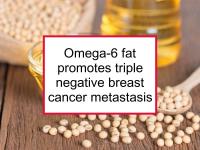Arachidonic acid is an omega-6 fatty acid found primarily in meat and meat products, including both red meat and poultry. Generally speaking, visible meat fat has a higher arachidonic acid content than lean meat. Arachidonic acid is also introduced into the diet through vegetable oils with high levels of the omega-6 fat linoleic acid.
This is because linoleic acid is metabolized into arachidonic acid in the body. Numerous studies have demonstrated that both arachidonic acid and linoleic acid (not to be confused with the omega-3 fat alpha-linolenic acid) promote breast cancer. Now a new study has reported the mechanism of action by which arachidonic acid promotes the migration and invasion of triple negative ER-/PR-/HER2- breast cancer cells.
Common cooking oils are sources of linoleic acid acid
Public health campaigns to reduce levels of consumption of saturated fat and partially-hydrogenated oil have left the impression that vegetable oils are a healthy choice. However, safflower oil, sunflower oil, corn oil, and soybean oil all contain high proportions of linoleic acid and consumption of them should be limited. Better choices are olive oil and walnut oil, which have better fat profiles and are also associated with reduced risk of breast cancer.
Latest research reports how arachidonic acid facilitates migration
The study referenced at the beginning of this news story was designed to investigate how arachidonic acid induces the migration (movement to a new location) and invasion of triple negative MDA-MB-231 breast cancer cells. Migration is one of the early steps in metastasis. The reciprocal reprogramming of both cancer cells and the surrounding tissues appears to guide invasion, as well as facilitating diverse types of dissemination. Arachidonic acid is present in cell membranes, however it can also be present in the microenvironment outside cells. Arachidonic acid and its metabolites are known to mediate focal adhesion kinase (FAK) activation, adhesion and migration in MDA-MB-231 breast cancer cells. FAK activation of various cellular pathways has been implicated in a diverse array of cellular processes, including migration, growth factor signaling, cell cycle progression and cell survival. In the present study, the authors show that arachidonic acid induces Akt2 activation and invasion in triple negative breast cancer cells. Activation of the Akt gene is frequently observed in human cancer cells. The authors demonstrate, for the first time, that Akt/PI3K and EGFR pathways mediate migration and invasion induced by arachidonic acid in MDA-MB-231 triple negative breast cancer cells.
Please see our article on what triple negative patients and survivors should eat for more information.
